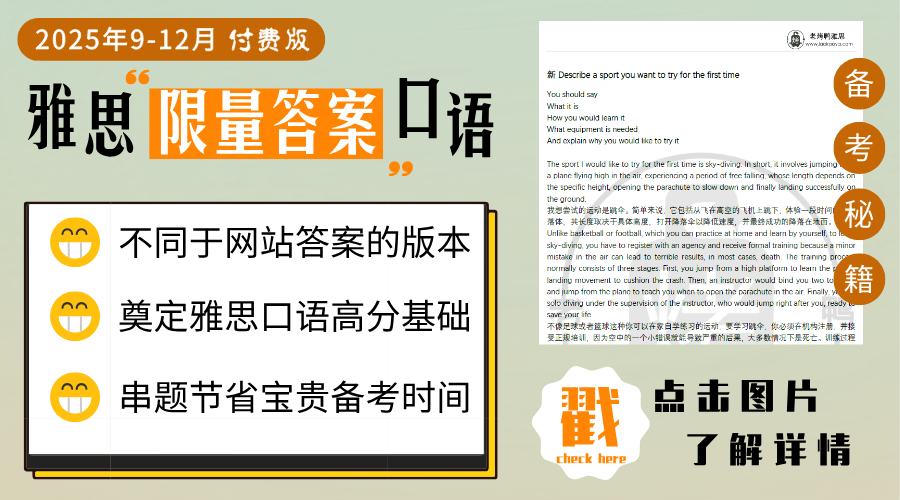剑桥雅思15Test1Part3听力原文与答案 Personality traits
剑桥雅思15听力第一套题目第三部分的主题为多胎家庭的子女性格研究。具体内容包括:不同次序/年龄的孩子的性格特点,过去研究中存在的缺陷,老大学习成绩不同的原因,以及兄弟姐妹竞争所带来的好处。下面是这段音频对应的录音原文。
点击查看这篇雅思听力具体题目的答案解析与其中出现的高频词汇:
剑桥雅思15Test1Part3听力答案解析 personality traits
剑桥雅思15 test1 part3雅思听力原文
RUTH: Ed, how are you getting on with the reading for our presentation next week?
ED: Well, OK, Ruth-but there’s so much of it.
RUTH: I know, I hadn’t realised birth order was such a popular area of research.
ED: But the stuff on birth order and personality is mostly unreliable. From what I’ve been reading a lot of the claims about how your position in the family determines certain personality traits are just stereotypes, with no robust evidence to support them.
RUTH: OK, but that’s an interesting point – we could start by outlining what previous research has shown. There are studies going back over a hundred years.
ED: Yeah-so we could just run through some of the typical traits. Like the consensus seems to be that oldest children are generally less well-adjusted because they never get over the arrival of a younger sibling.
RUTH: Right, but on a positive note, some studies claimed that they were thought to be good at nurturing-certainly in the past when people had large families they would have been expected to look after the younger ones (Q21).
ED: There isn’t such a clear picture for middle children – but one trait that a lot of the studies mention is that they are easier to get on with than older or younger siblings.
RUTH: Generally eager to please and helpful (Q22) – although that’s certainly not accurate as far as my family goes – my middle brother was a nightmare-always causing fights and envious of whatever I had.
ED: As I said – none of this seems to relate to my own experience. I’m the youngest in my family and I don’t recognise myself in any of the studies I’ve read about. I’m supposed to have been a sociable and confident child who made friends easily (Q23)– but I was actually terribly shy.
RUTH: Really? That’s funny. There have been hundreds of studies on twins but mostly about nurture versus nature…
ED: There was one on personality, which said that a twin is likely to be quite shy in social situations (Q24) because they always have their twin around to depend on for support.
RUTH: My cousins were like that when they were small-they were only interested in each other and found it hard to engage with other kids.
ED: They’re fine now though. Only children have had a really bad press – a lot of studies have branded them as loners who think the world revolves around them (Q25) because they’ve never had to fight for their parents’ attention.
RUTH: That does seem a bit harsh. One category I hadn’t considered before was children with much older siblings – a couple of studies mentioned that these children grow up more quickly and are expected to do basic things for themselves-like getting dressed (Q26).
ED: I can see how that might be true – although I expect they’re sometimes the exact opposite-playing the baby role and clamouring for special treatment.
RUTH: What was the problem with most of these studies, do you think?
ED: I think it was because in a lot of cases data was collected from only one sibling per family, who rated him or herself and his or her siblings at the same time.
RUTH: Mmm. Some of the old research into the relationship between birth order and academic achievement has been proved to be accurate though. Performances in intelligence tests decline slightly from the eldest child to his or her younger siblings. This has been proved in lots of recent studies.
ED: Yes. Although what many of them didn’t take into consideration was family size (Q27). The more siblings there are, the likelier the family is to have a low socio-economic status -which can also account for differences between siblings in academic performance.
RUTH: The oldest boy might be given more opportunities than his younger sisters, for example.
ED: Exactly.
RUTH: But the main reason for the marginally higher academic performance of oldest children is quite surprising, I think. It’s not only that they benefit intellectually from extra attention at a young age – which is what I would have expected. It’s that they benefit from being teachers for their younger siblings, by verbalising processes (Q28).
ED: Right, and this gives them status and confidence, which again contribute, in a small way, to better performance. So would you say sibling rivalry has been a useful thing for you?
RUTH: I think so-my younger brother was incredibly annoying and we fought a lot but l think this has made me a stronger person. I know how to defend myself (Q29). We had some terrible arguments and I would have died rather than apologise to him-but we had to put up with each other (Q30) and most of the time we co-existed amicably enough.
ED: Yes, my situation was pretty similar. But I don’t think having two older brothers made me any less selfish -I was never prepared to let my brothers use any of my stuff…
RUTH: That’s perfectly normal, whereas…
剑桥雅思15 Test1 Part3雅思听力答案
21. G
22. F
23. A
24. E
25. B
26. C
27. C
28. A
29-30. BD
剑桥雅思15Test1Part1听力原文与答案 Bankside Recruitment Agency
剑桥雅思15Test1Part2听力原文与答案 Matthews Island Holidays
剑桥雅思15Test1Part4听力原文与答案 The Eucalyptus Tree in Australia





